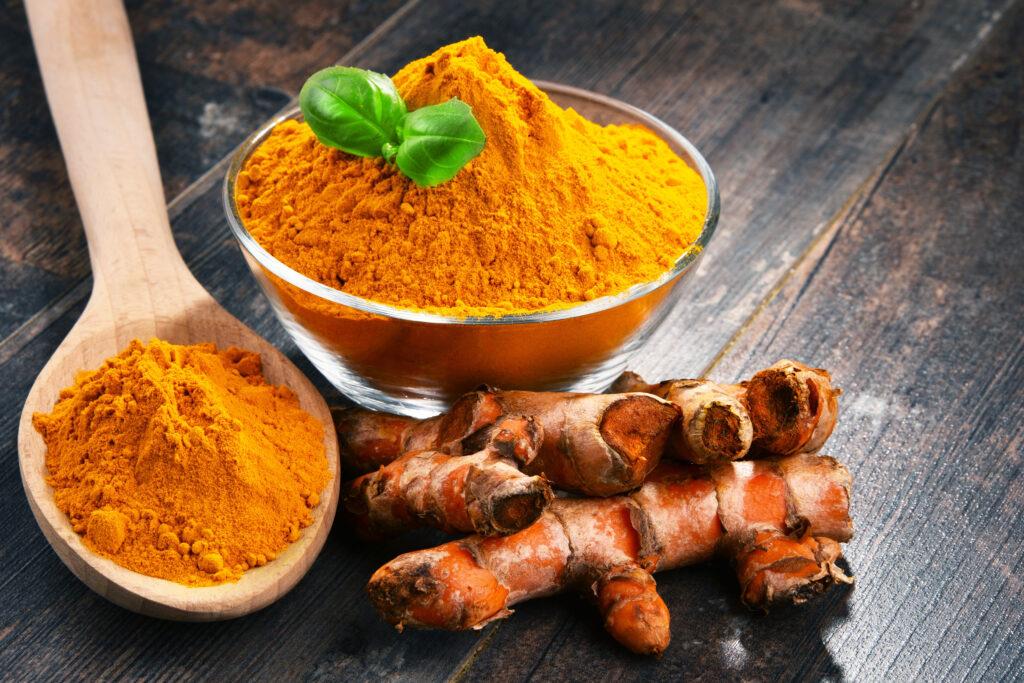If you’re looking to add some spice to your life, you might want to consider turmeric. This vibrant yellow spice has been used for thousands of years for its medicinal properties, and its popularity has skyrocketed in recent years thanks to its touted health benefits.
In this turmeric tell-all, we’ll explore what current-day research tells us about the health benefits of turmeric and the best ways to use it at home. Whether you enjoy it ground, juiced, or in its natural root form, we’ve got you covered with all the answers you need to know.

The Nutritional Profile of Turmeric
When it comes to macronutrients, turmeric doesn’t contain significant amounts of carbohydrates, protein, or fat. However, turmeric is a great source of micronutrients such as vitamins, minerals, and plant compounds. Turmeric contains impressive amounts of manganese, iron, potassium, and vitamin C. Additionally, turmeric contains curcuminoids, with curcumin being the most prominent and well-researched. These compounds belong to a class of polyphenols and have been shown to have antioxidant and anti-inflammatory effects. Curcumin is largely responsible for many of the benefits turmeric offers. Its antioxidant properties positively affect nearly every body system.
| Nutrient | Amount per 100g |
|---|---|
| Manganese | 26% of the Daily Value (DV) |
| Iron | 16% of the DV |
| Potassium | 3% of the DV |
| Vitamin C | 3% of the DV |
Overall, turmeric is a spice that is low in macronutrients but high in micronutrients, particularly manganese, iron, and vitamin C. Its curcumin content provides antioxidant and anti-inflammatory effects, making it a beneficial addition to your diet.
The Top 8 Health Benefits of Turmeric
Turmeric, a spice commonly used in Asian cuisine, has been used for centuries in traditional medicine to treat a variety of ailments. Recent research has confirmed many of the health benefits of turmeric, including its ability to boost immune health, champion heart health, aid metabolic health, improve mental health, encourage overall brain health, promote joint health, support gentle aging, and improve gut health.

Turmeric Boosts Immune Health
Turmeric is a rich source of vitamin C and plant compounds known as polyphenols, including curcumin, which have antioxidant and anti-inflammatory effects that boost immune health. These compounds search out and eradicate free radical molecules that are at the root of many chronic and acute illnesses. A 2019 study published in Nutrients even found curcumin to be effective against cancer.

Turmeric Champions Heart Health
Free radicals also contribute to heart disease, making turmeric a powerful preventative measure. Research has found that curcumin in turmeric is protective against atherosclerosis, plaque build-up on the arteries and veins that can lead to the development of heart disease, and overall heart disease risk. Turmeric may also help to manage high cholesterol levels in the blood, which can further contribute to atherosclerosis. The magnesium, potassium, and iron found in turmeric also support healthy heart rhythms and blood health.

Turmeric Aids Metabolic Health
Turmeric is a great addition for those with metabolic disorders like type 2 diabetes or those looking to prevent them. The spice has been found to aid in the regulation of blood sugars and the inflammatory response, helping to treat or prevent these conditions.

Turmeric Helps to Improve Mental Health
Turmeric is often turned to for mental health aid due to curcumin’s ability to increase brain-derived neurotrophic factor (BDNF) levels. BDNF plays an important role in behavior, learning, cognition, and memory, which bodes well for mood disorders like anxiety and depression. Several studies have found curcumin in turmeric to be effective in treating both conditions.

Turmeric Encourages Overall Brain Health
Turmeric may also help to ward off neurodegenerative disorders like Alzheimer’s disease and dementia. Curcumin’s ability to increase BDNF levels certainly has a hand in this benefit, but there’s also plenty of research to back these claims. Daily curcumin administration has been linked to improved memory, attention, and mood in older adults, thanks to decreases in amyloid and tau accumulation in the brain. Further research has also found a positive correlation between curcumin and Alzheimer’s disease prevention.

Turmeric Promotes Joint Health
The anti-inflammatory nature of turmeric benefits joint health, especially for those dealing with concerns like arthritis. Turmeric supplementation has been found to be nearly as effective as nonsteroidal anti-inflammatory drugs (NSAIDs) for individuals with osteoarthritis in the knees. Curcumin has also been found to be effective in treating osteoarthritis pain across the body.

Turmeric Supports Gentle Aging
Curcumin’s antioxidant properties are effective against signs of aging, such as fine lines, wrinkles, and dark spots. Several studies have shown this, including a 2021 review of the evidence available at the time of publishing.

Turmeric Improves Gut Health
Turmeric may also support a healthy gut by positively influencing the gut microbiome, which regulates and supports immune, brain, and digestive health. The gut microbiome is a colony of trillions of microorganisms found largely in the colon.
Incorporating turmeric into your diet can provide a variety of health benefits, from boosting your immune system to promoting joint health and supporting gentle aging. With its powerful anti-inflammatory and antioxidant properties, turmeric is a spice that should not be overlooked.
How Much Turmeric Should You Have Everyday?
To reap the health benefits of turmeric, it is recommended to consume no more than 12 grams, which is equivalent to about 2.5 teaspoons, per day. Consuming more than this amount may lead to diarrhea, constipation, or vomiting. Excessive supplementation of turmeric may also interfere with certain medications. Before significantly increasing your turmeric intake, it is important to consult with your healthcare provider, especially if you have any pre-existing medical conditions. It is important to note that while turmeric has many health benefits, it should be consumed in moderation to avoid any adverse effects.
Here are some key takeaways to keep in mind:
- The recommended daily intake of turmeric is no more than 12 grams, or about 2.5 teaspoons.
- Consuming too much turmeric may lead to diarrhea, constipation, or vomiting.
- Excessive supplementation of turmeric may interfere with certain medications.
- Consult with your healthcare provider before significantly increasing your turmeric intake, especially if you have any pre-existing medical conditions.
Ways to Use Turmeric At Home
Turmeric is a versatile spice that can be used in a variety of dishes. To ensure optimal absorption, it is recommended to consume turmeric with a source of fat and piperine. Here are some delicious and healthy ways to incorporate turmeric into your daily routine:
- Add turmeric to curries, stir-fries, casseroles, soups, stews, and pastas for a pop of color and flavor.
- Make a turmeric latte by adding turmeric, cinnamon, ginger, and honey to your favorite milk.
- Blend turmeric into smoothies for an added nutritional boost.
- Create a homemade health shot by mixing turmeric, lemon juice, ginger, and honey.
- Indulge in spiced baked goods like turmeric muffins or turmeric cookies.
Remember to pair turmeric with a source of fat and piperine for optimal absorption. With these simple and delicious ways to use turmeric at home, you can easily incorporate this powerful spice into your daily routine.
The Bottom Line
Incorporating turmeric into your diet can provide a range of health benefits. This superfood contains micronutrients, particularly curcumin, which possess antioxidant and anti-inflammatory properties. These properties can help support various aspects of your health, including metabolism, heart health, immunity, and brain function. Adding turmeric to your meals not only enhances the flavor but also provides a colorful addition to your plate. Consider incorporating this spice into your diet for a boost in overall wellness.






